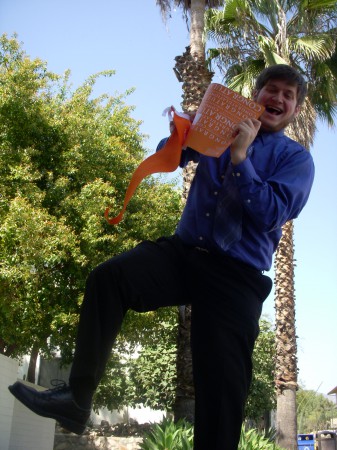I wanted to share an article with you that Angel wrote for the Chronicle of Higher Education about the experience of fall travel. The whole purpose of this blog is to help you, the students, get a better idea of the admission process by telling you about our lives, I figured I should post it, even though it is a little late. I hope you enjoy it, I know I did.
Dear Admissions Colleagues:
I write you today as I sit on a flight — one of the last legs of what feels like an endless fall recruitment season. I’m grateful to be sitting here. In fact, I almost wasn’t.
The alumni-affairs office asked me to make a presentation to our alumni board on current issues in admissions at Pitzer College and how they compare to issues facing the nation. The presentation began at 10:45 a.m., and I had a 1:20 p.m. flight to New York out of LAX. I was able to persuade a friend of mine to accompany me to the campus and have the getaway car ready; I figured if I left by 11:15 a.m., I could make my flight.
At 11:35, I darted out of the building and jumped into the car. “I think we’ll make it,” I said nervously, as I changed clothes in the back seat. I got a few strange looks, but it was either that or wrinkle the suit I needed to wear a few more times that week.
I had a sandwich waiting in the car so I could have my lunch. Just as I bit into it, our car came to a halt, and I looked up to see major traffic on the freeway. So we did what every frantic traveler does: exited and took local streets to an alternative freeway, breaking every law and safety regulation in the process.
Thirty minutes before takeoff, I arrived at the largest airport in the United States hoping to get through security in a New York minute. What can I say? I’m an optimist. Just as I was taking my belt and shoes off and placing them through the metal detector, my name was called on the loudspeaker. That was not the kind of last call I’m used to hearing. I leaned toward the closest security officer I could find and whispered, “They’re talking about me.” She let me skip everyone in line, and I darted off through the terminal and made it to the gate seconds before the door closed.
Sitting in my seat, exhausted and dazed, one thought occurs to me: Why the heck do I do this?
As the plane pushes off from the gate and I begin to write, my mind flashes through images of the last few months of my life. I remember my two-week trip through New England, where I switched hotels every day and visited high schools in almost every state of the region. I remember my speedy one-day trip to Chicago to serve as a panelist at a high-school program. There was that one-city-a-day Claremont Colleges Receptions tour that tends to leave you wondering what time zone you are in.
Let’s face it: It’s been a long admissions season. I’m tired, and so are you. I see those droopy eyes as you pull into the parking lot early in the morning, having just landed after a long flight. I notice the slower pace in your stroll as you greet a family visiting the campus on a Saturday morning. You smile in your usual manner, but I know you’re thinking that you can’t remember the last time you had a weekend without work. Being weary this time of year is common in the admissions business. I write to acknowledge that, and to let you know, it’s OK to admit it. But as I stare out of the airplane window, I begin to recall the many recent experiences I’ve had that explain why our work is invaluable and why it does indeed matter.
I remember a recent lunch meeting I had with a new student at Pitzer. She wanted to thank our office for helping her during the application process and for, ultimately, admitting her. We had a wonderful conversation and as we strolled out of the dining hall, we bumped into another first-year student. After my lunch partner introduced us, the student said, “Angel, I already know you. You and your staff changed my life!”
Not knowing how to respond, I asked, “How do you suppose we did that?”
“During my application process,” she said, “I met with you and several other members of your staff. All of you gave me the confidence to apply to this school and held my hand along the way. Then you folks admitted me and my life is significantly different. I can’t thank you enough.”
Then I think about the amazing students I have met during my travels this fall. I can clearly recall a conversation I had with a young man at his high school in Vermont. “I’ll be honest with you,” he said, “I’m from Vermont, and although I love it here, my world is so limited. I think it’s time to see the world.” We had the most inspiring conversation about his hopes and dreams.
That kind of conversation is why we travel. We reach out to families and jet around the country because the age of information technology hasn’t obliterated the power of personal contact.
We travel because when we meet a student who is the perfect fit for our college, we can make the case to fly her to the campus to visit during our diversity program. On one of the few nights we are home this fall, we stay late in the office to talk to her dad on the phone for an hour because he is scared of letting his little girl go to school on the West Coast. His family has already made a great leap from Africa to live on the East Coast of the United States, and he can’t fathom letting his daughter live five hours farther by plane.
We allow ourselves to stay late at a college fair, knowing we have a long drive back to our hotel through dark isolated roads because a mother needs to hear that although the economy is in turmoil, her son can indeed afford to go to college. We hold people’s hands, calm them down, and reassure them, it’s going to be OK.
As the plane finally reaches its cruising altitude, I think back to my recent meeting with a high-school counselor who came to visit the office. She’s a brand new counselor and works with an underrepresented population in her hometown. She took it upon herself to start visiting colleges and learning about the admissions process. She needed resources and a mentor, and even though she didn’t know it, she needed a reminder that what she was doing was valuable. A 15-minute meeting turned into a two-hour conference.
The business of college admissions is structurally complex, and it is compartmentalized into long, intense seasons. The highs are extremely high and the lows can be downright overwhelming; it’s easy to feel defeated and worn down, and to forget the transformative nature of our work.
Therefore, I ask you to take this moment to stop and turn off all the distractions that cloud your vision of the bigger picture. Before we move on to the next exhausting phase of our admissions year, before we greet our final fall visitors, before we begin to alphabetize thousands of credentials, before we start entering the data on those applications, before we calculate the thousands of dollars of financial aid needed, before we are curled over our kitchen tables with hundreds of applications, before we start obsessing over the numbers, before the news organizations start calling in search of a story angle on another extremely selective admissions year, I ask you to take a moment to breathe and exhale.
Acknowledge the impact of your work. What you do matters. In fact, I’ve been told it changes lives.
Angel B. Pérez is director of admission at Pitzer College.

Posted by Danny Irving, Admission Counselor
